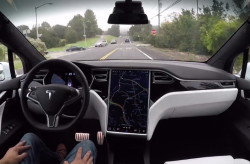
— A Tesla Enhanced Autopilot 2.0 class-action lawsuit that includes the Model S and Model X should be finalized soon as the plaintiffs and Tesla agreed on a proposed settlement that awaits approval by a federal judge.
Tesla originally said the class-action lawsuit was nothing more than an attempt by lawyers to make money by using arguments from owners who had an “inaccurate and sensationalistic” understanding of the technology.
The plaintiffs and Tesla agreed to settle the complaint before it went to trial, but the plaintiffs didn't exactly get what they wanted from the class-action lawsuit. Not even close.
According to the lawsuit, the plaintiffs wanted Tesla to buy back about 47,000 U.S. vehicles equipped with Enhanced Autopilot and to return any profits the automaker made from selling the vehicles.
Instead, Tesla has agreed to reimburse owners between $20 and $280 for the systems that cost each owner at least $5,000. Attorneys for the plaintiffs say Tesla agreed to set aside $5 million to cover the reimbursements and to pay attorneys' fees.
Although the lawsuit includes only U.S. Model S and Model X customers, Tesla says it plans on reimbursing customers worldwide.
The plaintiffs claim Tesla lied on its website about the capabilities of the $5,000 Autopilot feature and the availability of side collision warning and automatic emergency braking systems.
The plaintiffs say vehicles from other automakers come standard with automatic emergency braking, but Tesla's system was “essentially unusable and demonstrably dangerous.” While Tesla claims Autopilot will make driving safer, the plaintiffs allege safety features were “completely inoperable” and that Tesla's marketing was "all smoke and mirrors."
The plaintiffs further argue Tesla advertised Autopilot as a way to feel less stress while driving when in reality the automaker must have known how "deeply flawed, raw, and untested the software was and remains."
Although Tesla says it will settle the lawsuit, the automaker doesn't talk about the alleged safety claims made by the plaintiffs, including accusations of a "dangerously defective" feature called Traffic Aware Cruise Control.
Tesla says it has been honest with customers by admitting the features would roll out a little at a time, but the automaker also admits owners had to wait too long for Autopilot 2.0 features to become active.
As for claims concerning self-driving capabilities that were less than advertised, the automaker says:
“Furthermore, we have never claimed our vehicles already have functional ‘full self-driving capability,’ as our website has stated in plain English for all potential customers that ‘it is not possible to know exactly when each element of the functionality described above will be available, as this is highly dependent on local regulatory approval.”
The proposed settlement must still be given final approval by U.S. District Judge Beth L. Freeman.
The Tesla Enhanced Autopilot class-action lawsuit was filed in the U.S. District Court for the Northern District of California San Jose Division - Dean Sheikh, et al., vs. Tesla, Inc.
The plaintiffs are represented by Hagens Berman.




